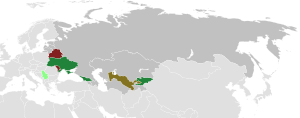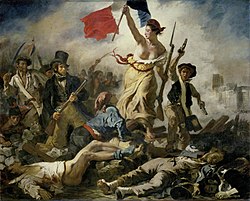Our website is made possible by displaying online advertisements to our visitors.
Please consider supporting us by disabling your ad blocker.
Colour revolution
| Colour revolutions | |
|---|---|
 Map of the colour revolutions
Revolution successful
Revolution unsuccessful
Protests' status as part of the colour revolutions disputed | |
| Location | |
| Caused by | |
| Methods | |
| Resulted in |
|
| Part of a series on |
| Political revolution |
|---|
 |
|
|
The colour revolutions (sometimes coloured revolutions)[1] were a series of often non-violent protests and accompanying (attempted or successful) changes of government and society that took place in post-Soviet states (particularly Georgia, Ukraine, and Kyrgyzstan) and the Federal Republic of Yugoslavia during the early 21st century.[2] The aim of the colour revolutions was to establish Western-style liberal democracies. They were primarily triggered by election results widely viewed as falsified. The colour revolutions were marked by the use of the internet as a method of communication,[3] as well as a strong role of non-governmental organizations in the protests.[4]
Some of these movements have been successful in their goal of removing the government, such as the Federal Republic of Yugoslavia's Bulldozer Revolution (2000), Georgia's Rose Revolution (2003), Ukraine's Orange Revolution (2004), Kyrgyzstan's Tulip Revolution (2005) and Armenia's Velvet Revolution (2018). They have been described by political scientists Valerie Jane Bunce and Seva Gunitsky as a "wave of democracy," between the Revolutions of 1989 and the 2010–2012 Arab Spring.[5]
Russia, China, and Iran have accused the Western world of orchestrating colour revolutions to expand its influence.[6][7][8][9]
- ^ Gene Sharp: Author of the nonviolent revolution rulebook Archived 22 February 2011 at the Wayback Machine, BBC News (21 February 2011)
Lukashenko vows 'no color revolution' in Belarus Archived 18 September 2013 at the Wayback Machine, CNN (4 July 2011)
Sri Lanka's Color Revolution? Archived 15 May 2022 at the Wayback Machine, Sri Lanka Guardian (26 January 2010)
(in Dutch) Iran, een 'kleurenrevolutie' binnen de lijntjes? Archived 28 June 2009 at the Wayback Machine, De Standaard (26 juni 2009)
(in Dutch) En toch zijn verkiezingen in Rusland wel spannend Archived 31 May 2013 at the Wayback Machine, de Volkskrant (29 February 2008)
(in French) "Il n'y a plus rien en commun entre les élites russes et le peuple" Archived 5 February 2013 at the Wayback Machine, Le Monde (6 December 2012)
(in Spanish) Revoluciones sin colores Archived 22 May 2013 at the Wayback Machine, El País (8 February 2010) - ^ Poh Phaik Thien (31 July 2009). "Explaining the Color Revolutions". e-International Relations. Archived from the original on 5 October 2011. Retrieved 13 January 2010.
- ^ Vinciguerra, Thomas (13 March 2005). "The Revolution Will Be Colorized". The New York Times. Archived from the original on 29 May 2015. Retrieved 12 July 2023.
- ^ Gilbert, Leah; Mohseni, Payam (1 April 2020). "NGO laws after the colour revolutions and the Arab spring: Nondemocratic regime strategies in Eastern Europe and the Middle East". Mediterranean Politics. 25 (2): 183. doi:10.1080/13629395.2018.1537103. S2CID 158669788.
- ^ Bunce, Valerie. "5 The Drivers of Diffusion: Comparing 1989, the Color Revolutions, and the Arab Uprisings". Oxford Academic. Archived from the original on 12 July 2023. Retrieved 12 July 2023.
- ^ Yang, Jianli; Wang, Xueli (29 August 2022). "Xi's Color Revolution Obsession". Providence. Archived from the original on 30 November 2022. Retrieved 30 November 2022.
- ^ Bolt, Paul J.; Cross, Sharyl N. (2018). "Emerging Non-traditional Security Challenges: Color Revolutions, Cyber and Information Security, Terrorism, and Violent Extremism". China, Russia, and Twenty-First Century Global Geopolitics. Oxford: Oxford University Press. doi:10.1093/oso/9780198719519.003.0005. ISBN 9780198719519. OCLC 993635784.
- ^ "30 years of "colour revolutions"". EUvsDisinfo. 14 January 2021. Archived from the original on 28 September 2023. Retrieved 12 July 2023.
- ^ Tezcür, Güneş Murat (February 2012). "Democracy promotion, authoritarian resiliency, and political unrest in Iran". Democratization. 19 (1): 120–140. doi:10.1080/13510347.2012.641296. ISSN 1351-0347.
Previous Page Next Page


